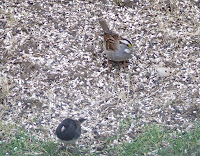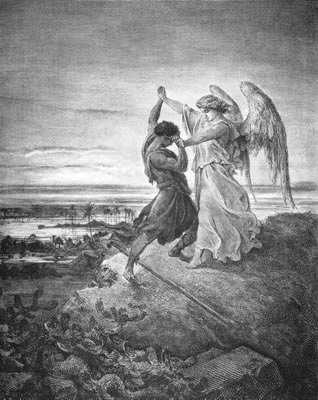 This afternoon I was working from home so I could meet the oven repairman for my gas range. It was a gusty day with the temperatures dropping on their way to the coldest point of the season tonight. I made sure to fill my feeders with seed and the birds flocked to them all afternoon, so I took some pictures of my regular visitors. At left is a chickadee, the most vocal and the tiniest.
This afternoon I was working from home so I could meet the oven repairman for my gas range. It was a gusty day with the temperatures dropping on their way to the coldest point of the season tonight. I made sure to fill my feeders with seed and the birds flocked to them all afternoon, so I took some pictures of my regular visitors. At left is a chickadee, the most vocal and the tiniest.Some of my favorite birds are the ones whose markings are the most subtle, like the junco and white-throated sparrow at below right. The WT sparrow has the obvious white patch at the throat, but so does a house sparrow. The difference is the little yellow eye dot, if you look closely, and the striped crown.
 The male house sparrow has a solid gray cap (no stripes) and a black "necktie" at the throat and breast. You can look at them side by side below at left. Juncos look like they're wearing a little black or gray frock-coat, the shades vary quite a bit. They have white breasts, obvious white outer tail feathers (best seen as they spread their tails in flight), and pinkish beaks. They are small and sparrow-like and stay mostly on the ground scratching around, rather than approaching the feeder. I saw one actually at the feeder for the first time only last week. I don't know what the big draw was. They are a bit more skittish than other birds -- quick to take flight when spooked, which unfortunately, I do often, because I'm always jockeying for a view.
The male house sparrow has a solid gray cap (no stripes) and a black "necktie" at the throat and breast. You can look at them side by side below at left. Juncos look like they're wearing a little black or gray frock-coat, the shades vary quite a bit. They have white breasts, obvious white outer tail feathers (best seen as they spread their tails in flight), and pinkish beaks. They are small and sparrow-like and stay mostly on the ground scratching around, rather than approaching the feeder. I saw one actually at the feeder for the first time only last week. I don't know what the big draw was. They are a bit more skittish than other birds -- quick to take flight when spooked, which unfortunately, I do often, because I'm always jockeying for a view. 
In this group is another favorite -- the sweetest little songbird, the song sparrow. They're small and solitary; I almost never see more than one at a time, scratching on the ground, never at the feeder. When they're out on the power line in front of the house in summer they sing up a storm, a beautiful liquid, melodius trill. They have the same soft brown sparrow coloring but they are noticeably more streaked, all the way down on the breast. They also have a striped crown.


The more colorful varieties are very familiar, like the cardinal, although I, of course, like the muted colors of the female. They are very elegant, whereas the male is brilliant. Today I also got the titmouse and curious downy woodpecker, but I was not quick enough to snap the Carolina wren or nuthatch. I usually get two or three goldfinches, with as many as six scrapping with each other at the four-perch feeder.
 While I've been completely too inattentive and distracted to read for the last month, I did take out my Christina Rossetti last night to read a few poems before bed. One of my favorites is "A Birthday" with the lines:
While I've been completely too inattentive and distracted to read for the last month, I did take out my Christina Rossetti last night to read a few poems before bed. One of my favorites is "A Birthday" with the lines:My heart is like a singing birdIt's a very simple poem, but one of the most beautiful lyrics in the language. It reminds me of that song sparrow singing in the hedge in summer.
Whose nest is in a watered shoot...














